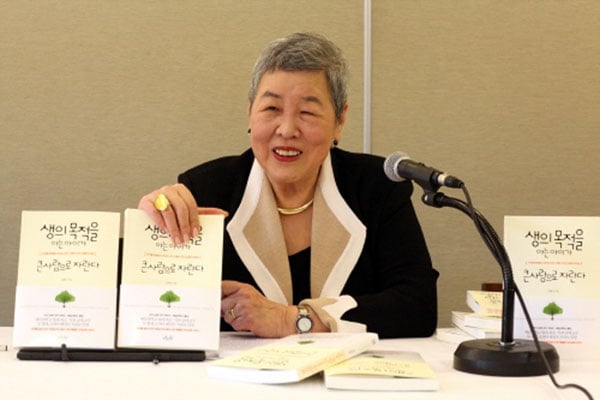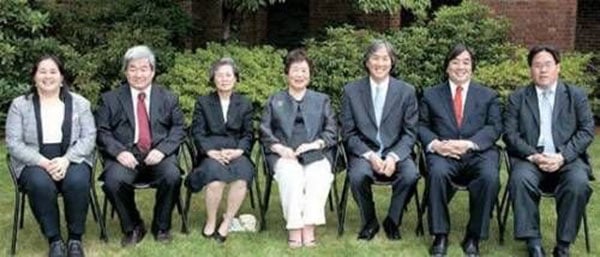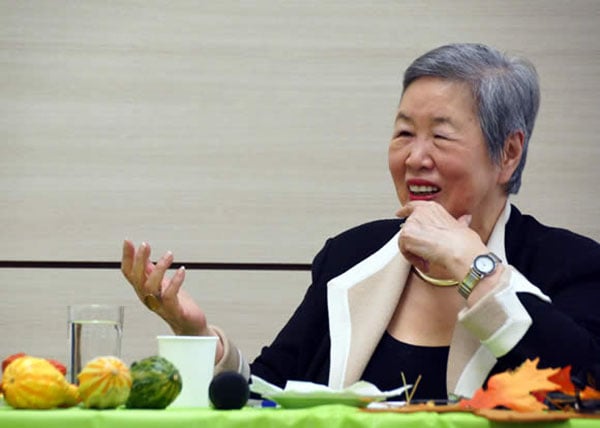Hesung Chun Koh is a PhD professor at Yale University and currently the director of the Dongyan Cultural Institute. She is known as the "Korean Super Mother". Throughout her life, she not only trained many excellent students but also raised 6 children who were admitted to the prestigious Harvard University and Yale University.
After graduating, her children became professors, deans at many famous universities, some worked at the US Department of Health, the White House, university presidents and many other important positions.
The New York Times commented: "This successful family can be compared to the most famous Kennedy family in American history. Now, Ms. Hesung Chun Koh has become the most ideal role model for mothers in the world to follow."

Mrs. Hesung Chun Koh.
Ms. Hesung Chun Koh is a former student of the English Department of Ewha Womans University in Korea; she received a scholarship to study for a PhD in Social Anthropology at Boston University in the United States. While teaching at Yale University, she met and married Dr. Kwang Lim Koh. The couple was recognized as the first Asian professors to teach at Yale University. Her husband later had the opportunity to become the Korean ambassador to the United States in the 1960s.
Both professors with impressive academic backgrounds, Mr. and Mrs. Hesung Chun Koh have been truly successful in guiding and raising their children in their future choices. Below are Mr. Hesung Chun Koh’s parenting secrets:
1. Pay attention to the primary school stage
In an interview, Jeon Hye Sung said that her eldest daughter once couldn't keep up with her class and was called in by her homeroom teacher. After that, she promptly guided her daughter to overcome the difficulties and eventually became a Harvard graduate scholar. Therefore, it is not necessary to have a high IQ to achieve success.
When asked about her method of educating her children, she smiled and replied that in fact, any child can become outstanding if they find the right method. Especially in primary school, if parents help their children lay a solid foundation, they will achieve success in the future.
Why does Jeon Hye-sung emphasize the elementary school stage of children? This is related to brain development at this stage.
Studies have shown that at age 9, the "network" structure in the brain develops rapidly. Children will evaluate people and things around them, then react according to their own preferences. And this reaction will become the child's future behavioral pattern.
For example, if a child thinks that learning is difficult, boring and uninteresting, he will unconsciously develop aversion, avoidance or procrastination. On the contrary, if children think that learning is interesting and valuable, they will actively learn without being urged by their parents.
Children will form such a behavioral pattern in primary school, which is basically very difficult to change after entering secondary school. Therefore, if parents want their children to learn proactively and independently, they must help them grasp the important stage of primary school.

Studies have shown that age 9 is the age when the "network" structure in the brain develops rapidly. Illustration photo
Things to note when raising children in primary school
What to do when your child doesn’t like doing homework? This is probably the question that most parents struggle with. In fact, when children resist studying, most of the time it’s because they don’t know how to overcome difficulties.
Adults consider learning to be very easy for children, but children consider it very difficult, boring, and miserable. That is why not all children are ready and happy to learn.
Whether learning is easy or difficult greatly affects a child's learning ability. Therefore, parents need to pay attention to cultivating their child's learning ability in primary school, especially in the following aspects:
Concentration
Knowledge in grades 1 and 2 is still quite simple, but from grade 3 onwards, the difficulty will gradually increase, at this time the concentration of each child will be clearly differentiated. Children who do not concentrate on studying and thinking in class will have a very large difference in scores.
To train children's ability to concentrate, when they are concentrating on something, parents should not disturb them.
Once a child's concentration is interrupted, it takes a long time to refocus and is difficult to train this into a habit.
In addition, parents can play some educational games with their children such as puzzles and rubik's cubes, which can also help children improve their concentration.
Logical thinking skills
Logical thinking is the basis for understanding mathematics and physics later on, children must master this ability.
Parents can buy some puzzle books about reasoning and judgment for children. Some children like to read detective stories, which can exercise their logical thinking ability.
Allow children to ask questions and encourage them to think for themselves and find answers.
Read a book
Reading books has many benefits for children.
Reading books can not only open the door to children's perception of the world, but also satisfy their curiosity. When children are immersed in books, their concentration will be naturally cultivated.
If children form good reading habits from an early age, they will have more passion and interest in learning.
As a child learns more, they will have a sense of achievement compared to their peers. This sense of achievement will motivate children to read and learn actively.
In short, if parents can cultivate the above aspects, their children's learning ability will be greatly improved.

Ms. Hesung Chun Koh, over 90 years old, takes a photo with her children.
2. Parents do not need to sacrifice for their children
According to Ms. Hesung Chun Koh, all parents always want their children to live happily and joyfully. But sacrificing everything for their children and suffering for their children is not the best way to raise children. Parents should be coaches, advise, guide and help their children confidently and firmly step into the future to do what they want.
" When I was pregnant with my first child, like most other parents, I did not know how to properly care for and raise my child and be useful to society. Then I thought about how my parents taught me. They are a typical example of parents not necessarily sacrificing unconditionally for their children, but their children still always achieve success and live useful lives.
My parents always tried to study, expand their career path, and enrich their life experiences regardless of their age. This motivated us a lot later on. I also applied this educational method when teaching my children. I did not give them everything, but only what was within my ability," she shared.
3. Create an environment to read anytime, anywhere
No matter where in the house, it is necessary to maintain a learning atmosphere. Instead of forcing children to study, children just need to see other members studying hard, they will naturally consider studying as a part of life.
As long as parents make their children understand that studying is not something special, but a part of everyday life. If parents can sit at the table naturally, children will approach the table and feel happy about it.
4. Mothers should not miss the opportunity to develop themselves.
" When my child entered high school, I was faced with the choice of continuing to work or staying home as a housewife. In the end, I still chose work. But, at that time, choosing work meant that I had to try 200%. I always had to arrange my time skillfully so that I wouldn't forget my children because of work. At that age, children need their parents' advice more than anything. Therefore, when my child had problems at school and needed to talk, I chose to be by his side."
According to Asian beliefs, when getting married, women should devote most of their energy to the home instead of focusing on work. That is why many mothers, due to social pressure, have missed opportunities for themselves and their unfinished passions to become a good mother.
It is true that parents are mirrors that reflect the attitude and efforts of their children. If you want your children to live well, parents must live positively. If you want your children to be good, parents must be able to prove their abilities. Parents should think about their goals, plan their lives, arrange their time, and improve their abilities so that their children can follow their example.

If you want your children to live well, parents must live positively. If you want your children to be good, parents must be able to prove their abilities.
5. Parents need to respect and treat each other well.
The mutual respect between parents will have a decisive influence on the character of their children. Parents who often quarrel, especially in front of their children, will certainly have problems in their children's development.
In their married life, Hesung Chun Koh and her husband still quarrel but they try to communicate to solve the problem. Another important reason is that they do not want to affect their children and want to set an example for them.
The process of educating children is also the process of husband and wife loving each other. Couples with good feelings will certainly educate their children more successfully.
6. Know how to listen to your child
" When my second son did a research project at medical school, despite his best efforts, he was not highly evaluated. He felt very sad and indignant because his project was not worthy. When I heard him complain unfairly that "Many other students are worse but are highly evaluated", I advised him that if he was confident about the project and still had doubts, he should try to find the person who evaluated his project, ask why they rejected it, and then find an opportunity to explain the advantages of his project.
Complaining behind their backs is useless. And after listening to that advice, my child had the opportunity to reevaluate the project. The final result made him very satisfied. More or less, parents who know how to listen and share with their children are commendable. No matter what age they are, children still need their parents' "shield" when they are weak.
Parents' advice is at least based on observations or life experiences, so for their children, it is certainly trustworthy. However, many parents think that the age gap makes parents and children no longer close. In such cases, children turn to friends - who think the same way - for advice.
Parents should also "lower themselves" in some cases, they cannot be conservative and old-fashioned forever to have the opportunity to talk and listen to their children's confidences. That way, the children will have stronger faith in their parents.
7. Let children feel that family is the most precious thing
Hesung Chun Koh's family maintains the habit of eating breakfast every day. No matter how busy they are, they always have to follow this rule. Not only because of the importance of eating breakfast for the body, but also because it can make children realize the value of "family".
In the morning, seeing their child's expression, parents can guess what is going on and show concern. Showing concern does not mean asking direct questions. If parents ask directly, they may make the child feel uncomfortable when they think that the parents have discovered something. Especially for teenagers, mood swings are very erratic. If parents are not careful, they will make the child feel disgusted and they may fall into a more chaotic state.
8. Encourage your child to exercise
According to Ms. Hesung Chun Koh, parents only focus on their children's studies, so in addition to regular studies, they also have extra classes at night, extra classes on weekends... However, parents should really care about their children's abilities and spend a lot of time exercising with them because that will be one of the key factors to help their children succeed.
" My first son was quite weak when he was born and had to go to the doctor several times a month. I always felt miserable and didn't know how to improve his health. After thinking it through, whether it was a boy or a girl, I came up with a principle: 3 years old is the age to start focusing on health training.
In early autumn, my children will be introduced to cold water. First, washing their hands, then their arms, then their legs, and finally bathing their whole bodies. The adaptation period is about 1 month, starting from 25 degrees Celsius. In the following days, I gradually lower the temperature by one degree, and after 1 month of training like that, my children can all withstand contact with 0 degrees Celsius water. Thanks to that, my children adapt to the weather very quickly and rarely get sick.
Every morning, regardless of the weather, I encourage my children to run 3km every day. In addition, they also participate in many other sports such as mountain climbing, martial arts, weightlifting..."
9. Encourage your children to do positive things without supervision
One time, Hesung Chun Koh's eldest daughter called her mother and said she was going to South America to do something for poor children. She also volunteered to help families of tsunami victims. Or her second child came to her and said, "I'm raising money for AIDS, can you donate some money?"
A child's talent is when they are trained little by little every day, growing quietly while helping others, like a seed accidentally planted, expecting nothing but one day it grows strongly.
Therefore, whenever someone asks Hesung Chun Koh about any special education methods, she would say: "Don't just cultivate children's talents, but also focus on nurturing good character, guiding a child to become someone who knows how to help others."
Source: https://giadinh.suckhoedoisong.vn/ba-me-6-con-thi-co-tan-5-nguoi-vao-harvard-tiet-lo-bi-quyet-day-con-dac-biet-la-vao-giai-doan-phat-trien-nay-17224052111161981.htm


![[Photo] National Assembly Chairman Tran Thanh Man chairs the meeting of the Subcommittee on Documents of the First National Assembly Party Congress](https://vphoto.vietnam.vn/thumb/1200x675/vietnam/resource/IMAGE/2025/5/8/72b19a73d94a4affab411fd8c87f4f8d)
![[Photo] General Secretary To Lam begins official visit to Russia and attends the 80th Anniversary of Victory over Fascism](https://vphoto.vietnam.vn/thumb/1200x675/vietnam/resource/IMAGE/2025/5/8/5d2566d7f67d4a1e9b88bc677831ec9d)
![[Photo] President Luong Cuong presents the decision to appoint Deputy Head of the Office of the President](https://vphoto.vietnam.vn/thumb/1200x675/vietnam/resource/IMAGE/2025/5/8/501f8ee192f3476ab9f7579c57b423ad)
![[Photo] General Secretary concludes visit to Azerbaijan, departs for visit to Russian Federation](https://vphoto.vietnam.vn/thumb/1200x675/vietnam/resource/IMAGE/2025/5/8/7a135ad280314b66917ad278ce0e26fa)
![[Photo] Prime Minister Pham Minh Chinh meets with the Policy Advisory Council on Private Economic Development](https://vphoto.vietnam.vn/thumb/1200x675/vietnam/resource/IMAGE/2025/5/8/387da60b85cc489ab2aed8442fc3b14a)

























































![[Photo] Prime Minister Pham Minh Chinh talks on the phone with Singaporean Prime Minister Lawrence Wong](https://vphoto.vietnam.vn/thumb/402x226/vietnam/resource/IMAGE/2025/5/8/e2eab082d9bc4fc4a360b28fa0ab94de)


































Comment (0)